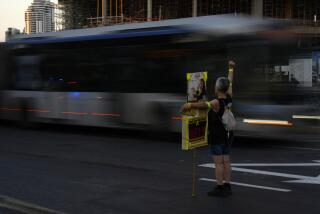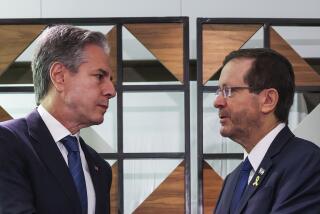U.S. Ratchets Up Pressure on Arafat to Stem Violence
WASHINGTON — The second Palestinian suicide bombing in two days drew new U.S. demands Thursday for forceful action by Palestinian Authority President Yasser Arafat, as the State Department put the organization that claimed responsibility for the blast on its official list of terrorist groups.
“Mr. Arafat must do more to stop the violence,” President Bush declared in El Paso as he began a trip to Latin America, just hours after a 21-year-old bomber killed three Israelis in downtown Jerusalem. The bombing, by a member of a militia linked to Arafat, brought an abrupt halt to U.S.-sponsored talks in the region that had been making some progress toward a cease-fire there.
In an Oval Office appearance before the attack, Bush said he was “disappointed” in Arafat’s efforts to stop the violence, which has killed a total of more than 1,500 people on both sides during the last 18 months.
The State Department announced Thursday that it had designated the Al Aqsa Martyrs Brigade, the militia that took responsibility for the latest attack, as a “foreign terrorist organization.” The action, which was taken Tuesday and reported to Congress on Wednesday, makes it illegal for Americans to provide funds or other forms of support to the group and requires U.S. banks to freeze any assets on deposit.
The brigade is an offshoot of the Tanzim, the armed wing of Arafat’s Fatah movement, although “it remains unclear to what extent they act out of knowledge and approval of senior leadership of the Fatah,” State Department spokesman Philip T. Reeker said.
Al Aqsa is the first Palestinian organization to be added to the official terrorist list since the latest round of Israeli-Palestinian fighting began in September 2000. Some members of Congress had been pushing for the militia to be placed on the list.
In an interview with Bill Moyers for a PBS telecast tonight, Marwan Zaloum, an Al Aqsa commander, pledged: “We will continue until we vanquish the occupation and until the creation of the Palestinian state. This is the message that the whole world has to understand.”
Arafat’s position as the leader of the Palestinian cause has been impaired by the continuing violence. Some analysts said that the inclusion of Al Aqsa on the list of terrorist organizations will probably further weaken Arafat’s authority because of the group’s ties to his Fatah faction.
“It will tend to undermine him,” said Philip C. Wilcox Jr., a former director of Israeli affairs for the State Department.
Even so, Wilcox said it remains important for the United States to deal with Arafat, because “he is the only Palestinian leader of any legitimacy.”
Thursday’s suicide bombing came only two days after the Bush administration sharply stepped up its involvement in the Israeli-Palestinian conflict by offering the possibility of a meeting between Arafat and Vice President Dick Cheney. The vice president would be the most senior member of the Bush administration to meet with the Palestinian leader.
But the meeting depends on Arafat taking a series of steps, set out last year by CIA Director George J. Tenet, to move the Palestinians toward a cease-fire, such as giving the Israelis advance warning of possible violence, collecting illegal arms, halting weapons smuggling and closing bomb factories.
Although U.S. officials remained vague on prospects for the Cheney-Arafat meeting, they notably didn’t call it off after Thursday’s attack, which came just a day after another suicide bomber killed seven people on a bus in northern Israel.
The meeting could be held as early as next week if Anthony C. Zinni, the Bush administration’s point man in the Middle East, determines that Arafat has met conditions laid out by the United States.
Israel, however, canceled a meeting with the Palestinians that had been scheduled for Thursday night to discuss a truce. Instead, Prime Minister Ariel Sharon convened an emergency session of his security advisors to weigh reprisals.
Alleviating the Israeli-Palestinian conflict has become increasingly important to the Bush administration in recent days as it has become clear that the United States will need to achieve progress in that arena if it is to win broader Arab support for its campaign against Iraqi President Saddam Hussein. As Cheney toured the Middle East during the last week and a half, he was told again and again that the United States needed to step up its involvement.
Secretary of State Colin L. Powell, who accompanied Bush on his trip to Latin America, called Arafat from Air Force One to deliver a blunt message that the Palestinian leader must restrain his followers, spokesman Reeker said.
Powell called on Arafat “to condemn today’s acts publicly and personally in the strongest manner, in English and in Arabic,” Reeker said. “The secretary told Chairman Arafat he must punish the leaders of organizations responsible for recent attacks, making sure those responsible are brought to justice.”
The secretary of State also insisted that Arafat give the Palestinian security services “unambiguous orders” to enforce a cease-fire and that he make a serious effort to stop the violence, Reeker said.
Powell later had a 15-minute conversation with Sharon.
In the West Bank city of Ramallah, Arafat publicly condemned Thursday’s suicide attack.
More to Read
Sign up for Essential California
The most important California stories and recommendations in your inbox every morning.
You may occasionally receive promotional content from the Los Angeles Times.











